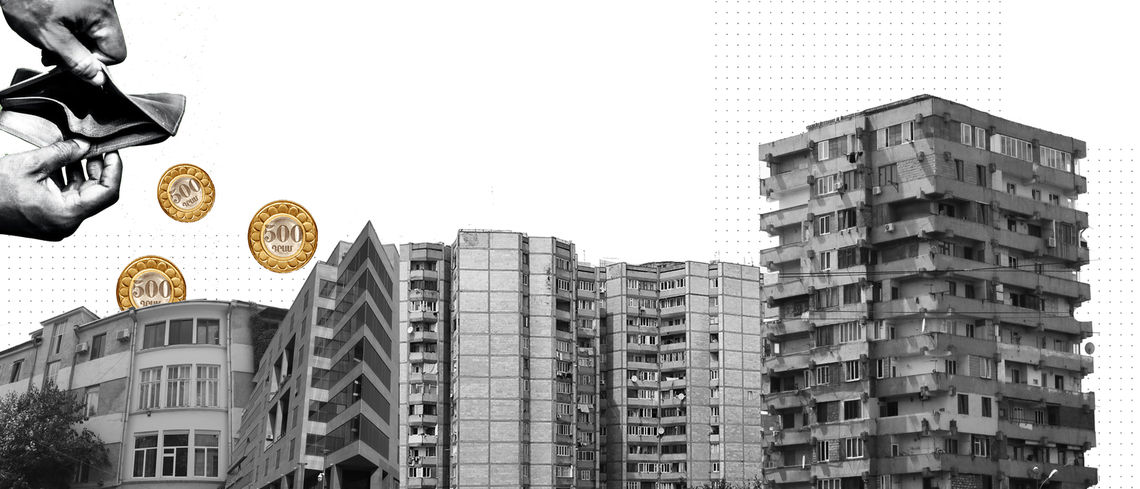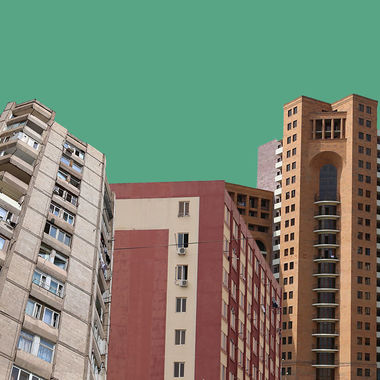Thu Jul 30 2020 · 8 min read
Property Tax Increases Expected to Reform an Obsolete Approach

By Astghik Karapetyan

“I am definitely in favor of a property tax increase,” says 62-year-old piano teacher Susanna Balyan. “If we want to have a normal state, we should pay. Nothing comes for free. I am now sure that these funds will flow into the state budget and we will have normal roads, schools and a combat-ready army.”
She says that her salary has increased by 25% over the last two years, and since April of this year, she qualified for a social benefit package. “You can’t imagine how many times we have requested our salaries and social benefits be reviewed, asked the state to ensure our sphere [music education] is not ignored, since we do the same job as teachers at regular schools,” Balyan says adding that her teacher’s pension also increased.
Balyan now lives alone in an 80 square meter apartment in the heart of Yerevan that she inherited from her parents. She currently pays 6600 AMD/year in property tax ($13.65). In 2021, she will be paying less, but by 2026, her bill will increase by a factor of 4, to around 25,000 AMD/year ($51.76). She believes in the government’s reforms and hopes that her income will increase further by 2026.
However, the property tax increase also has its detractors – efforts in this direction have led to a wave of furious debates and criticism in the past months.
The Existing Property Tax Regime is Obsolete
On June 25, 2020, the National Assembly (NA), Armenia’s Parliament, passed Bill G-651, stipulating new and higher property tax rates to come into effect on January 1, 2021, and extending taxation to all real estate property [currently, real estate with a cadastral value below 3 million AMD ($6200) is exempt from taxation.]
The transition to the new and higher property tax regime will be smoothed out over the course of six years. Henceforth, property owners will pay only 25% of the newly-calculated property tax amount in 2021, 30% in 2022, 35% in 2023, 50% in 2024, 75% in 2025, before being fully phased in at 100% in 2026.
This legislative change is the logical continuation of another law adopted by the NA back in November 2019. The Law on Defining the Procedure of Market Valuation for the Purpose of Taxing the Real Property enabled harmonizing the market and cadastral values for real estate. Beginning in 2021, the tax rates, as well as the cadastral system of appraising property values, will change. There is currently a huge gap between the cadastral and market values, with the cadastral value substantially lower than the market price. The discrepancy results in low taxes being paid for real estate with high actual market prices (but artificially lower cadastral value).
“The property taxation regime is outdated in the sense that the underlying tax base – the so-called cadastral value – substantially deviates from market prices. Therefore, there is a chasm between the two calculations and a fair tax burden is not ensured,” says Ori Alaverdyan, Head of the Income Policy and Administration Methodology Department of the Ministry of Finance.
He notes that changes in this field were initiated with the objective to establish a reasonable rate of burden: “Market values were approximated and the rates were calculated in such a way as to avoid any unbearable tax burden.” Alaverdyan brings up the case that there are very few apartments with a cadastral value over 40 million AMD. Such apartments will have their property tax rate set at 1% of the property value per year. Following the latest amendments, the number of apartments in this category significantly increased; in order to avoid an unbearable tax burden, the rate was lowered to 0.4% of the property value per year.
How Was the Cadastral Value of a Property Calculated?
A property tax calculator was created and is already operational to help property owners calculate the amount of the property tax they can expect to pay after 2021.
Hakob Hakobyan, Head of the Cadastral Appraisal Division of the Cadaster Committee, underlines that the tax is based on the cadastral value approximated to the market value, rather than the market price of the property tax. New cadastral values were established based on the contract prices registered at the Cadaster Committee and an analysis of around 51,000 valuations performed by property appraisers. “In order to obtain more reliable data, we have used the radial method, which is quite efficient. We have put all prices on the map, got the pricing zones – 1-20 zones.”
For each pricing zone, mean prices of the properties were taken and deducted by 20 percent. For instance, in the most expensive zone, the price for 1 sq. m. was set at 330,000 AMD, for the cheapest 20th zone, 92 AMD.
Advancing Social Equity by Taxing “Visible Wealth”
During the Government session on May 27, 2020, Prime Minister Nikol Pashinyan noted, “Yes, property taxes will increase and they will mostly go up for those properties which we provisionally call chateaus, mansions and so forth. If we look at the property taxes for [more modest] homes, we see that, in fact, [their increase is only] symbolic.” He has illustrated that there are estate homes currently paying 800,000 AMD annually, that will see their property tax bill rise to 15 million AMD.
On the other hand, the issue of offsetting the impact of the introduction of a flat income tax structure is finally being addressed. Economist Hrant Mikayelyan notes that the approach to addressing inequality will shift toward considering wealth over income. Furthermore, the economist thinks that these adjustments will compensate for the reduction in state revenue caused by the flat income tax regime.
“In the context of the introduction of the flat income tax rate from January 1, 2020, the need to apply adequate and progressive taxation on visible wealth and luxury property units is prioritized, as only this will allow for the efficient implementation of the redistributive function of the state, thereby ensuring a fair and reasonable regime of taxing individuals belonging to different income clusters,” notes the justification section for the amendments.
Ori Alaverdyan brings the provisional example of “rich” and “poor” citizens, who now all pay the same 23% income tax rate. The rich are able to capitalize their excess income thanks to the rate reduction (this is a common behavior), while the poor are not. “If he is capitalizing, then we are taxing the capital, firstly because it is visible and very easy to monitor, and, secondly, to ensure a fair approach to taxation,” he explained.
Increasing Municipal Budget Revenues
“In Armenia, the potential for property tax revenues as a key income source for municipal budgets is almost unutilized,” states the bill’s justification section. It also notes that, according to the statistics collected by the International Monetary Fund, the property tax/GDP ratio in Armenia is 0.2%, compared to 1.1% in Georgia, 1.2% in Russia, 2.7% in the US and 2.0% in Israel.
Alaverdyan says that total revenues currently collected from property tax amount to 9 billion AMD, which is slated to increase to 40 billion AMD in 2026. Thus, municipal revenues will increase by a factor of four, creating opportunities to enhance local services and infrastructure.
There is a concern, however, that the windfall could be offset by future reductions in national budget transfers to municipalities. Mikayelyan mentioned that such transfers will probably be gradually cut back as property tax income stabilizes municipal revenue. “It depends on the Government’s approach as to how territorial development will be prioritized.”
Alaverdyan notes, “There is no such aim, and the Government does not intend to cut such grants.”
What if Market Prices Fall?
The outbreak of the pandemic has caused economic hardship and there is concern that real estate prices might come down. “At present, there is no deflation in the real estate market,” notes Hakob Hakobyan, head of the Cadastral Appraisal Division of the Cadaster Committee, and adds that cadastral appraisal is conducted every three years. The next iteration is scheduled for 2023. However, if deflation does occur, the Cadaster Committee may propose a change to the baseline values and the zone profiles, for approval by the National Assembly.
Timing is Everything
Alaverdyan notes that one should take into account that the proposed tax burden is not unbearable and the increase will not be fully phased in until 2026. A number of properties - close to 510,000 units - will even see a reduction in their 2021 property tax bill as the new calculation method is introduced.
Although news of a tax increase was not welcome during the coronavirus pandemic, failing to amend the Tax Code now would have created challenges starting from January 1, 2021. In November 2019, following the adoption of the new property appraisal procedure, the tax bases for January-February of this year were already defined by the Cadaster. The provision of the Laws on Property Tax and on Land Tax will be effective till January 1, 2021, while after that the rates set in the Tax Code will automatically apply. These rates are quite high and shall be applicable to most real property items. As noted above, the current rate for a property valued more than 40 million AMD is set at 1%, whereas with the new changes, it will be 0.4%. At the same time, according to the old cadastral assessment, there are very few properties valued at over 40 million AMD, but with the new system, the value of a significant portion of properties will be assessed closer to that value. If legislative changes were not made, then after January 1, 2021, the property tax rate for many citizens would have been unbearable.
Substantive public discussion on the property tax increase focused on those citizens who have modest incomes, but live in apartments that have seen their values rise significantly due to their prime location. For example, a single pensioner living in Central Yerevan with only their meager pension income may not be able to absorb the increase without impacting their quality of life. To address this issue, the Government has made it clear that no one will be evicted from their residence for non-payment of the property tax and pension income will not be garnished to recover these debts. Instead, any outstanding amount will be recovered when ownership is transferred, due to sale or inheritance.
հոդվածը հայերենով
Գույքահարկի բարձրացում. ինչու՞ և ինչպե՞ս
also read
Income Tax: Flat or Progressive?
By Ani Avetisyan
Economist Ani Avetisyan looks at the recent decision by Armenia’s government to switch to a flat income tax system and argues that cutting tax rates is not an efficient tool for decreasing shadow economy if a country is institutionally underdeveloped.
Buying Real Estate in Armenia: One Diasporan’s Experience
By Harout Manougian
Are you interested in purchasing a home in Yerevan? If so, Harout Manougian offers some invaluable information and advice and more importantly, tips on how to avoid the inevitable pitfalls in an unregulated real estate market.
by the same author
Layoffs and Job Cuts: Unregistered Workers at Risk of Losing Everything
By Astghik Karapetyan
When a State of Emergency was declared in Armenia because of the COVID-19 pandemic, many people lost their jobs. Many of them were unregistered workers and today have found themselves more vulnerable than ever.
Efficiency, Flaws and Potential Dangers of Phone Tracking
By Astghik Karapetyan
For nearly three months, a tracking system overseeing the phone calls and locations of citizens has been implemented to prevent the spread of COVID-19. EVN Report’s Astghik Karapetyan talked to several experts on the efficiency, flaws and possible dangers of the system.
Domestic Violence and the Pandemic: How the Vulnerable Have Become More Vulnerable
By Astghik Karapetyan
Women, the elderly and children living under the same roof with violent abusers became even more vulnerable during the quarantine. Calls to domestic violence hotlines in Armenia have increased by almost 30%.








EVN Report welcomes comments that contribute to a healthy discussion and spur an informed debate. All comments will be moderated, thereby any post that includes hate speech, profanity or personal attacks will not be published.